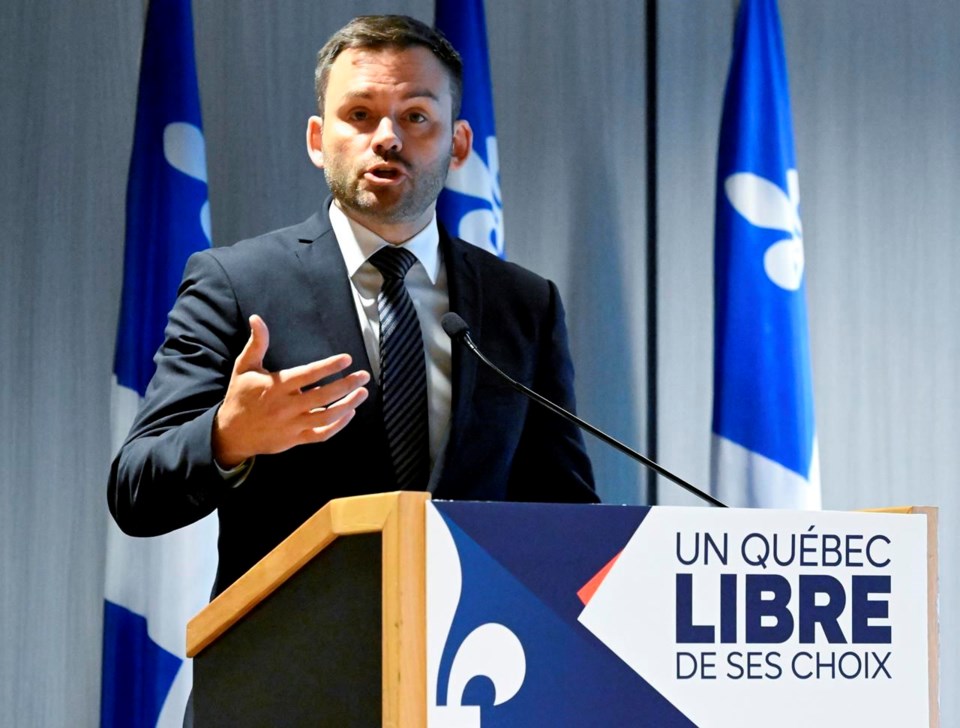QUEBEC — The Parti Québécois has released a study that it says shows an independent Quebec would be financially viable despite the mountain of debt it would inherit.
The party on Monday published its forecast of the revenues and expenditures Quebec would expect in the first year after declaring independence. PQ Leader Paul St-Pierre Plamondon said though it would start off with a projected gross debt of almost $400 billion, the province would have an advantage on two key benchmarks: its deficit and the proportion of its debt to its economic output.
The 84-page study suggests that if Quebec were to become independent, it would run lower deficits than if it remained a province. That would have resulted in a combined reduction of $12 billion in deficits over the period from 2021 to 2028, it concludes.
"Our situation is slightly more financially favourable if we are a country than if we stay a province in Canada," St-Pierre Plamondon declared in Quebec City.
The PQ calculates that Quebec would be able to retain $82.3 billion in annual revenue that the federal government would otherwise extract and save $8.8 billion by eliminating redundancy between provincial and federal functions.
St-Pierre Plamondon insisted those sums present an opportunity for Quebec to reinvest in local services rather than fund what he characterized as misguided, misdirected and wasteful federal government projects.
"If we repatriate $82.3 billion, are we going to pursue missions that are sometimes secondary, peripheral, sometimes I'd even say frivolous?" he asked. "Or are we going to choose to spend on things that I'd qualify as fundamental missions of the state: take care of our people, educate our children, take care of our elders, provide services to the population."
The budgeting exercise comes at a time when the PQ holds just four seats in the legislature, though the polling firm Léger has reported a surge in support for the party in the last year, from eight per cent of Quebecers in May 2022 to 22 per cent last month. Support for Quebec independence sat at 36 per cent among Quebec adults in August, according to a Léger survey.
The projected gross debt of $397 billion includes Quebec's share of the federal debt, estimated at more than $185 billion. But the PQ document says an independent Quebec would still rank more favourably in terms of debt-to-GDP ratio than the 2021 average among the 38 developed countries that belong to the Organization for Economic Co-operation and Development. Among the G7 countries, only Germany would have a more advantageous ratio, St-Pierre Plamondon said.
His party has gone through the budgeting exercise a handful of times since 1973 to define the financial framework in the event of Quebec sovereignty. It's the first time the party has produced such a document since 2005, when it was presented by then-PQ member François Legault, now the Quebec premier and leader of the Coalition Avenir Québec.
St-Pierre Plamondon was careful to emphasize that the latest study follows the same methodology, based only on current government services and spending, as if a newly independent Quebec "wouldn't make any different choices." He claimed it therefore represents an "objective evaluation of the financial situation of a free Quebec."
The presentation of the study on Monday ends months of teasing by St-Pierre Plamondon. But despite the fanfare, McGill University political science professor Daniel Béland says the move is less about furthering the separatist cause than satisfying the PQ’s base amid competition from other parties.
Once the banner carrier of the sovereignty movement, the Parti Québécois now counts eight fewer seats in the provincial legislature than rival sovereigntist party Québec solidaire.
"They want to send this message that the PQ is the real party for people who care about sovereignty," Béland said in an interview. There's also the added benefit of undermining Legault, who now distances himself from the movement, he added.
"This is part of their strategy also, to put François Legault in the less comfortable situation," Béland said.
This report by The Canadian Press was first published Oct. 23, 2023.
— With files from Thomas MacDonald in Montreal
Patrice Bergeron, The Canadian Press



